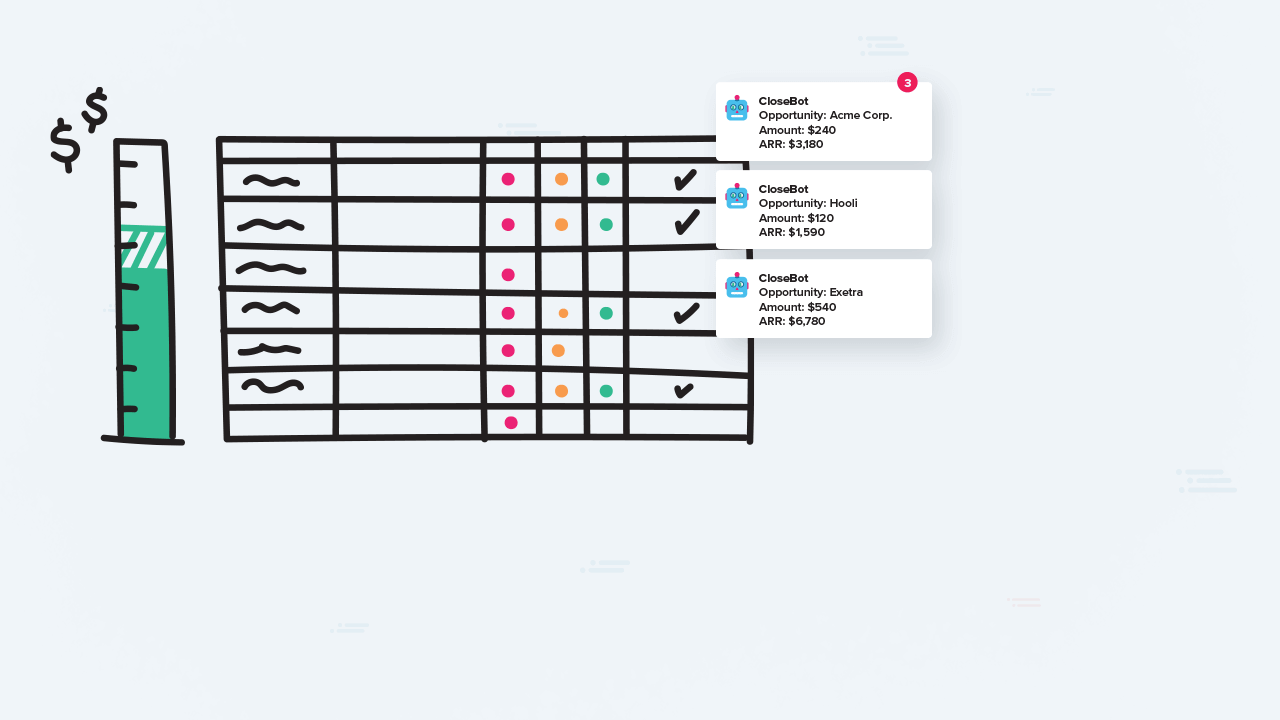Need a new way to incentivize your team? You can’t hand out rewards unless you know whether your team is actually succeeding. Learn how to monitor sales performance and you’ll have your finger on the pulse of progress. Here’s how to set up tracking and make life easier as you and your team race toward a common goal.
What is sales performance?
Sales performance is a measurement of how well a salesperson or sales team is doing their job. In other words, are they selling? And if so, how much? This measurement should be quantifiable, meaning it’s a concrete number or percentage. Sales managers use sales performance to gauge whether their team is on track to meet a predetermined sales goal. In many instances, just achieving profitability or converting a prospect into a customer isn’t enough proof that everyone is on target. Sales performance should be looked at as a relative number to track progress and identify room for improvement.
Why is it important to monitor sales performance?
It’s impossible to know what to do next if you don’t know how you’ve done so far. Monitoring sales performance helps everyone on the sales team identify winning tactics and which approaches may not be so effective. By seeing how your team is performing, you can make smart, educated decisions. Instead of guesswork, you can tweak your game plan based on actual numbers generated and evaluated in real time.
And sales performance monitors more than just total sales, too. There are a number of sales metrics or KPIs you might track, such as:
- Sales per source
- Sales per demographic
- Sales per salesperson
- New customers vs. recurring sales
- Total sales in a defined time period
- Average length of the sales cycle
- Average revenue per customer
Armed with these numbers, you can identify new ways to increase motivation
Why it’s challenging to monitor sales performance when working from home
Thanks to the COVID-19 pandemic, there’s been a sharp rise in the number of people working from home. But the truth is, there’s been increasing activity in the WFH space for years. The number of employees telecommuting from home has jumped by 173% since 2005. Studies find that team members who are allowed to work from home are more productive and more loyal, but there are some downsides.
Getting up-to-date info on lead generation and close rates might be easier when your whole team is under the same roof, but there are alternatives. If your team is working remotely, it’s vital you come up with a way to track and share everyone’s activity. Working in isolation can be demotivating. There are more distractions and more reasons to push off those follow-up calls until tomorrow.
That kind of attitude can have devastating consequences. That’s why you should make it a priority to keep your entire team connected. Send out regular updates. Make a big deal every time someone hits a benchmark. Let there be no mistake that this business is everyone’s business. Stoke the fires of competition by creating a leaderboard and updating it regularly.
Setting clear goals and KPIs
KPIs, or key performance indicators, are values that offer clear, measurable insight into a certain business objective. There are tons of metrics to track on a sales team. The trick is choosing the ones that are the most relevant to your organization. Here are a few ideas to get you started:
- New leads and opportunities
- Sales cycle time
- Emails and calls
- Opportunity win rate
- Cost to revenue ratio
- Deals closed
The metrics you choose may change depending on your current goal or campaign. You may even have different metrics for each salesperson. One may need to work on their overall number of contracts. Another may struggle with average deal size.
5 tips for monitoring sales performance
So, now you know why it’s crucial to monitor sales performance, but what’s the easiest way to keep tabs?
1. Leverage your CRM
Seek out customer relationship management (CRM) software that has a visual dashboard. Salesforce and HubSpot help you track your funnel and deliver a bird’s-eye view of performance at the same time. This user-friendly and super transparent approach keeps reps motivated and the whole team on target.
2. Keep your progress front and center
Out of sight means out of mind. Display sales KPIs on a big TV display on your second monitor. A giant whiteboard is a less tech-forward option, but it works well in a pinch. Update as deals move through your pipeline, or use it to compare the progress of everyone on your team.
3. Automate with Slack
Slack is a project management platform that streamlines communication. First, integrate Slack with your CRM. Then, create a dedicated channel, and Slack will automatically pull in all closed/won deals. You’re giving the sales team increased visibility, and you’re funneling data to the whole company.
4. Old-fashioned 1-on-1s
If you’re a salesperson, carve out time to meet with your manager on a regular basis. If you’re a sales manager, same idea, just in reverse. Use the time to review recent calls and uncover any roadblocks that may be standing between you and the finish line. The goal? To strategize how to close the deals in your pipeline and bring in more prospects — over and over and over again.
5. Take advantage of the right tools
Don’t ignore technology. Sales platforms and support software are there for a reason. QuotaPath makes it easy to track your commissions and monitor quota attainment. You can set goals and track your progress, all via an easy-to-use dashboard. Reps can sell smarter, not harder, and make strategic decisions that impact their earnings by forecasting to see earnings potential. It’s another example of gathering key intel to fuel winning strategies, but this time, the tech is doing the legwork.
Empower your team with up-to-date commission tracking and other key tools courtesy of QuotaPath. To get started, create your custom workspace today.



